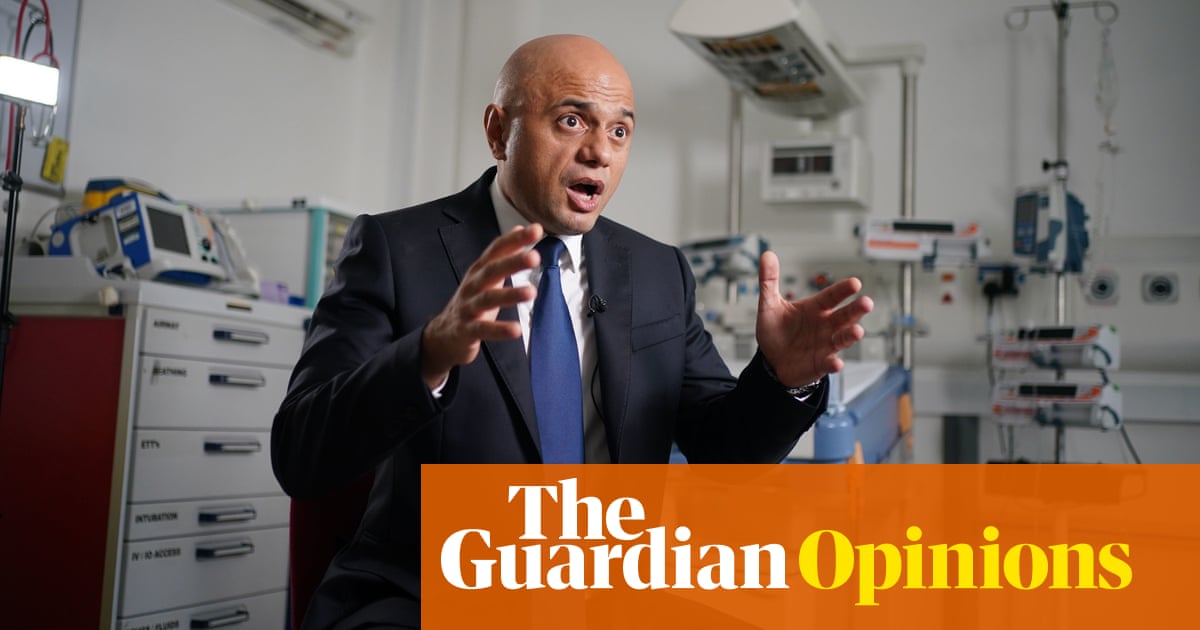
Sajid Javid, a former chancellor and health secretary, has written approvingly of the £20 fee that some European countries charge for visits to the GP. He labels Ireland’s €75 (£66) bill for attending an A&E without a GP’s referral as merely “nominal”, as if it’s so modest that a higher charge would be more appropriate. And he calls for a national debate on the contribution private financing can make to healthcare.
But the direction in which the Conservatives are travelling is already clear. The sick would pay for being sick and charging would force, as has happened with GP and hospital fees in France, the better-off sections of the population to take out private insurance – inevitably creating, in its wake, a two-tier healthcare system.
Javid’s intervention in favour of what he calls “nothing short of a 1948-style moment” is no accident. The prime minister, Rishi Sunak, who has used private healthcare, once came up with a proposal for new charges: £10 for patients who miss GP and hospital appointments. And so once again, as they did in opposition at the turn of this century, with Alternative Prescriptions, Conservatives are testing the water for a different kind of NHS.
Today’s Conservatives may have clapped NHS nurses and health workers at the height of the pandemic; yet they are not only opposing decent remuneration for them, but also contemplating a more privately financed healthcare system. It reminds us that exactly 75 years ago they opposed the introduction of the NHS, having attempted in 1944 to impose charges and private insurance.
So comprehensively have senior Conservatives lost sight of the uniqueness of the NHS that their model for future healthcare is not Britain, but Ireland, continental Europe and the United States of America. All this points to them abandoning the special characteristics of a great institution that expresses a very British set of values – that healthcare is not a privilege to be bought, but a right for all who are in need of it.
Their desire to break with the British model is not only morally concerning: it would also be very costly and economically wasteful. Never do NHS doctors or nurses have to ask sick patients, “Who is paying for this?” When we leave the hospital or GP surgery we are not pursued by bills or subject to complex negotiations with insurance companies or legal threats. But as the overseas experience of billing and means-testing shows, charges not only mean higher administration and collection costs – and thus raise far less than is predicted – they also discourage the sick from seeking treatment until too late, when more severe problems require not only more intensive, but more expensive interventions.
Conservatives argue that charging is one way – and perhaps the only way – to secure the long-term funding that the NHS needs. I understand well the cost pressures that come with a projected 82% increase in the number of over-85s in 25 years, and from not just continuously high waiting lists but also – and more worryingly – the health needs of an estimated 15 million, in England alone, who suffer from chronic or long-term diseases, and who are likely to be the biggest users of NHS resources.
I am also fully aware of the huge medical advances taking place, from genetics and stem cell therapy to transplantation, and in the treatment of cancer and heart disease. These will be essential but expensive additions to all modern healthcare systems.
As a former chancellor, I have said for some time that the NHS refinancing that Labour achieved in 2002 – a 6.3% real terms annual rise between 2000 and 2010 – had to be revisited every decade. This hasn’t happened under the Conservatives, and the consequences are visible to all of us. But the pressures the NHS faces make the case for comprehensive funding through national insurance even stronger; and show why this is to be preferred to either European-style social insurance, or private insurance.
The reasons are clear. None of us know in advance which of us or our family members will need medical interventions or hospital stays, the costs of which could run into hundreds of thousands of pounds. A system that guarantees comprehensive cover paid for by general taxation and that shares the costs across the whole population is the best insurance policy we could dream up – and indeed, if properly funded, is bound to be the best in the world.
And such a national insurance system is best equipped to meet even greater pressures ahead arising from further advances in medical knowledge. For as DNA gives private insurers more information about each person’s susceptibility to ill health and offers the possibility of anticipating future risks, companies will be reluctant to cover large sections of the most at-risk population, except at an exorbitant cost. It is this new reality, arising from welcome scientific breakthroughs, that makes the pooling of risks and resources and the sharing of costs across the whole of the UK even more important.
Even in these circumstances, Conservatives may prefer, as a matter of ideology, a private sector performing inefficiently to a public service delivering well. Indeed, neoliberals seem to find more joy in one person joining Bupa than 60 million people using the NHS. But what we know of the rising pressures from health inequalities, from the path-breaking work of Michael Marmot, should turn the focus of our attention from this ideological sideshow of charging and private insurance to tackling entrenched poverty and the other social determinants of ill health. It is by attacking and eradicating the causes of ill health that we will do most to reduce waiting lists and pressures on the hospital sector.
Our full attention should also be, as Keir Starmer has advocated, on the efficiencies to be achieved by reform and modernisation within the health and social care system. This will achieve far more than spending our time debating private financing coming in from the outside. The focus should be on a reformed social care system, which starts not from the hospital or the nursing home, but from where most elderly people want to be – in their own home, supported by home help, health visitors and domiciliary care. This can prevent them, in turn, from having to enter care homes – or being labelled “bed blockers” in our hospitals.
As we celebrate 75 years of the NHS on 1 July, we should recall the Labour health minister Aneurin Bevan’s words, proposing Britain’s revolution in healthcare. He said that our NHS would “lift the shadow from millions of homes”, by providing what he called “serenity”. And it would do so because, as a result of its free universal coverage, “rich and poor are treated alike, poverty is not a disability and wealth is not an advantage”.
Gordon Brown was UK prime minister between 2007 and 2010












